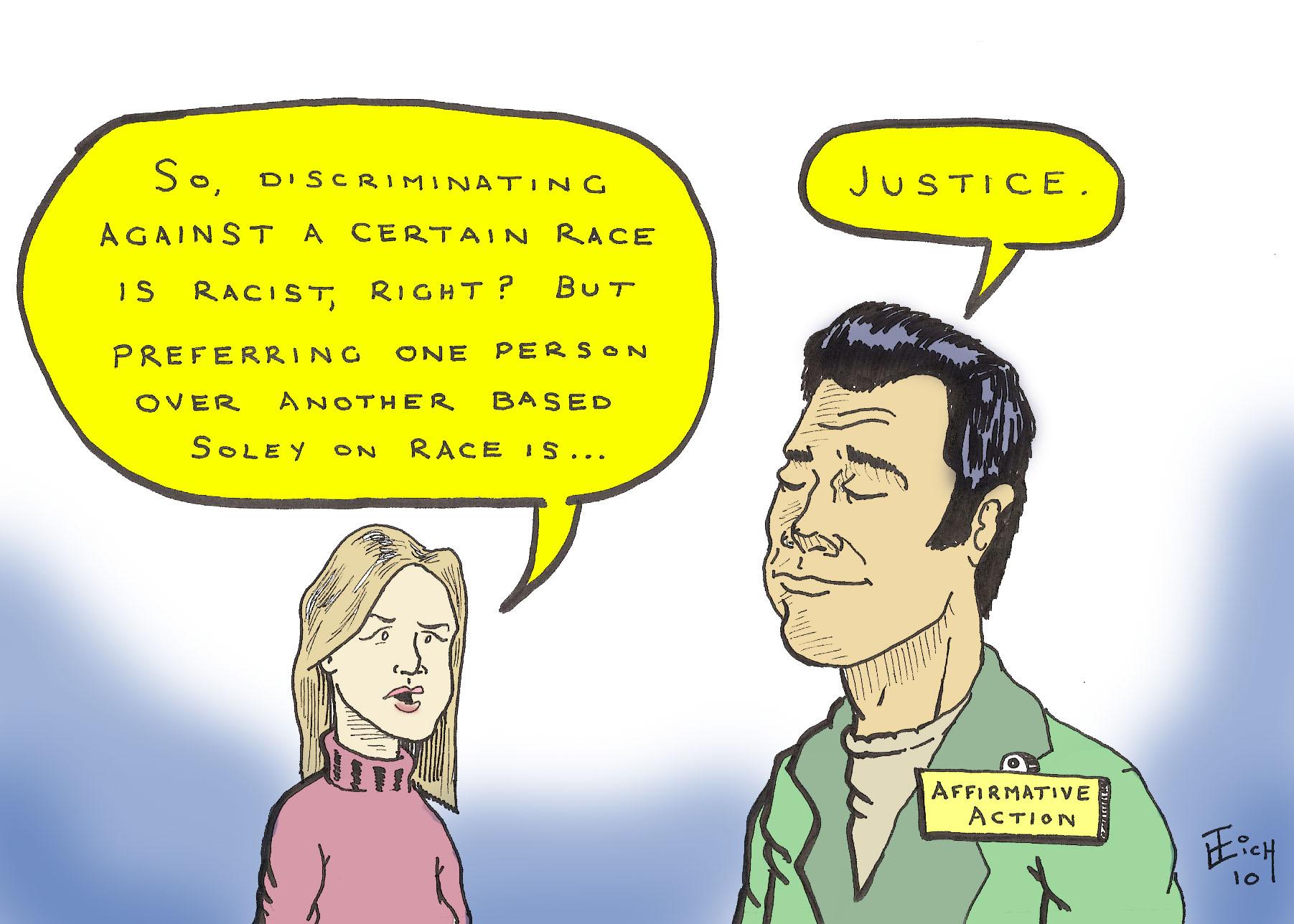This country is built on foundations absent of entitlement. The meritocracy built on these foundations has developed a society unlike any other. We are not judged by the color of our skin; and the proper noun that follows our first name has no bearing on our future.
It wouldn’t be wrong to describe this understanding as idealistic but to say that it is not something we strive for, well, that’s where one would be wrong. In other words, “unamerican” would be the one who fights for anything different.
In steps that contradict the very foundations of this country, the Coalition to Defend Affirmative Action, Integration, and Immigrant Rights and Fight for Equality By Any Means Necessary (BAMN) announced last Tuesday, that they will file suit on behalf of California students, in order to overturn voter-approved Proposition 209.
As a reflection of language already found in our Constitution, this proposition was passed, with 54 percent of the vote on Nov. 5, 1996. Opposition was concentrated in Los Angeles County as well as the Bay Area. The proposition prohibits state institutions from considering race, sex or ethnicity.
Proposition 209’s biggest role has, undoubtedly, been in higher education. After its passage in 1996, public universities in California were barred from admitting students based on race, sex or ethnicity. This effectively ended affirmative action in the University of California system and the California State University system.
Yes, minorities in this country have not always been treated equally under the law. They’ve been segregated, attacked and even enslaved. But is affirmative action really the remedy for about 200 years of discrimination? The answer is no.
From the Emancipation Proclamation to the Civil Rights Acts of the ’60s, the United States has continued to correct its wrongs. Affirmative action in higher education should not be a part of these corrections.
Discriminating against white students simply because they form a majority of applicants is not defendable as correction for discrimination against minorities in the past, nor is it defendable as a means of shrinking some sort of socioeconomic gap. Furthermore, assuming the latter would be based on the assumption that most or all minorities are socioeconomically disadvantaged. This last assumption brings us to our point.
Proponents of affirmative action seemingly operate under the belief that minorities will consistently be disadvantaged — when it comes to higher education — simply because they are a minority. It is obvious, however, that nowadays universities do not prevent minority individuals from matriculation simply because they are minorities.
Given this, why did UC Berkeley’s acceptance of African American and Hispanic students drop from 50 percent to 25 percent after the passage of Proposition 209?
The disproportionate acceptance of white students to California universities is not based on race or discrimination toward minorities. White students simply tend to have better GPAs and test scores. Consider this, according to Industrial and Labor Relations Review, in 1995 — the year before the passage of Prop 209 — 20 percent of UC Berkeley’s freshmen class was non-white. The average SAT score of non-white students was 1003; the average SAT score of the entire freshmen class was 1155. At the same time, 64.8 percent of the freshmen class had a GPA of 3.7 or higher while 47.6 percent of minorities had this same GPA.
It would be asinine to assume that this disparity is inherent in race or that it is some biological manifestation. The issue here is socioeconomics.
Californians who support affirmative action need to refocus their efforts. California must find a way to correct this disparity in academic success, early on. Focus should not be placed on affirmative action at the university level; instead programs should be developed at the primary and secondary levels.
Let us afford the same educational advantages high-income families have to low-income families. Every child deserves a shot at a good education but no one deserves a free pass.
Accepting students who weren’t as successful academically as their peers does our state a disservice. It lowers the bar for minority students and deflates the value of our degrees. It also robs exceptional minorities of the pride gained from being accepted to a top-tier California university.
Affirmative action is an egregious policy that does not take into account the foundations of this country. No American is entitled to anything his fellow citizen is not entitled to.




